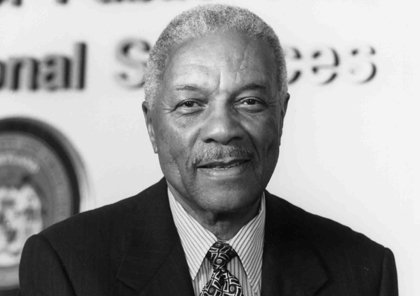Years before Bishop Robinson became Baltimore’s first black police commissioner, I made this observation: That man deserves to be police commissioner.
It was, if memory serves me correctly, 1980. Jawan McGee, a black East Baltimore teen, had just stopped off in a pizza shop.
A white off-duty Baltimore police officer happened to be in the same pizza parlor. When McGee reached into his pocket and pulled out a cigarette lighter, the cop pulled out his gun and fired several shots.
McGee was wounded and left paralyzed for life.
The cop swore the shooting was justified. He claimed McGee was casing the pizza shop for a robbery, and that he thought the cigarette lighter was a gun.
Outraged Baltimoreans didn’t buy one word of it. They demanded, at the very least, that the cop be fired. Others wanted criminal action taken against the officer.
Community forums were held so that citizens could come and give their opinions about the McGee case. One of these forums was held in Kweisi Mfume’s district. Mfume, at the time, was a city councilman from the Fourth District.
Mfume was supposed to be one of the panelists at the forum, but he arrived late. Activists had demanded that Donald Pomerleau, then Baltimore’s police commissioner, come to the forum and face the heat for McGee’s shooting.
Pomerleau, upon learning of the demand for his appearance, must have decided to get in touch with his inner wuss instead. And his inner wuss must have told him, “Facing the heat isn’t your job.”
So Pomerleau decided it was the job of one Col. Bishop Robinson to face the heat. Pomerleau sent Robinson in his stead, and the reception he got was more than just citizens expressing their opinions.
It was more like citizens venting their outrage, and all that outrage was directed at Robinson. The heat Robinson had to face rose to volcanic proportions.
Even 33 years later, I remember my reaction as I sat there and watched Robinson get skewered: “Whatever they’re paying this guy, it ain’t enough.”
Later, Mfume did show up, and he got some skewering himself, from a local activist. The exchange between Mfume and the activist left the councilman visibly miffed, and we discussed the night a few days later.
Mfume said what disturbed him most was that the charges the activist made against him weren’t true. Then I gave him my take.
“You know, you got off easy. What you got was nothing compared to what Bishop Robinson got.”
Mfume replied that he had noticed the miffed look on Robinson’s face when he arrived and had wondered what was troubling the man.
I have no way of knowing what was going through Robinson’s mind at the time of this crisis. But I have a hunch that he concluded that someone was going to pay for all the abuse he took.
That someone turned out to be the cop that shot McGee. At his trial board hearing, Robinson subjected that officer to the most ruthless line of questioning a cop had ever faced, according to news reports at the time.
One year later, Pomerleau must have grown weary of sending black officers to face the heat he should have faced and resigned. Frank Battaglia succeeded him and retired in 1984. Robinson served as commissioner from 1984-1987.
It must have been quite a journey from 1952— when Robinson joined a force that didn’t allow black officers to patrol white neighborhoods or ride in patrol cars— to reach the top of the department.
Robinson, I’m sure, had to endure plenty of abuse and unfairness in what was a backward police department when he joined it. That’s one of the reasons I was overjoyed when he was named police commissioner in 1984.
